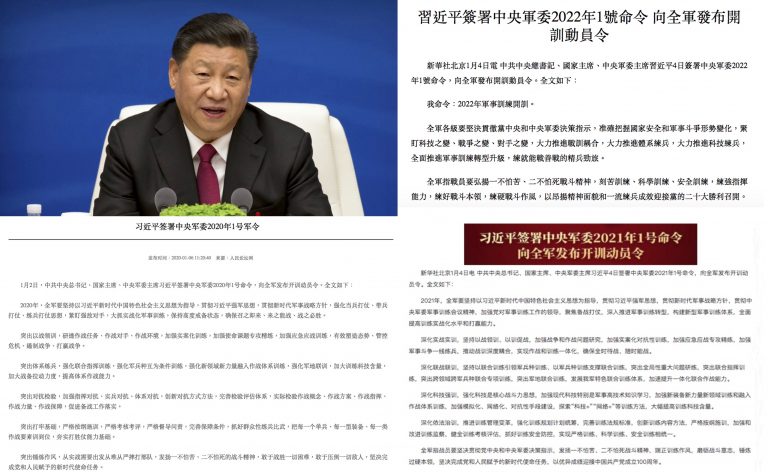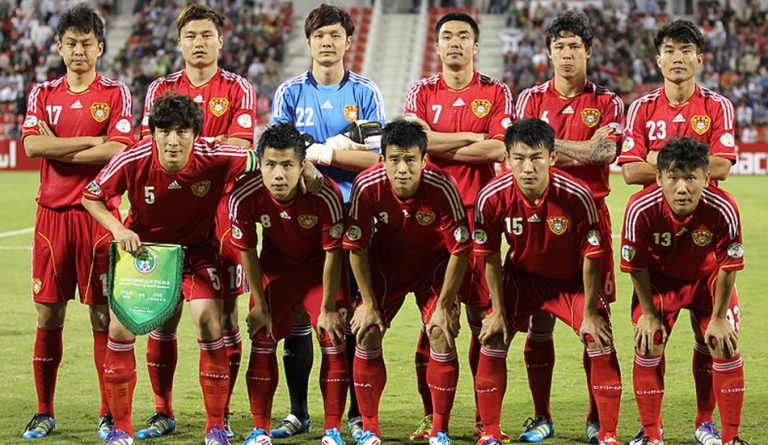News analysis
On Jan. 4, Chinese leader Xi Jinping issued Military Order No. 1 to the People’s Liberation Army (PLA), the first task the communist regime’s armed forces received this year.
Though the order is largely a formality and reads similarly to those issued in previous years, the 2022 instruction is much shorter and focuses on a political task: ensuring a “victorious convening” of the Chinese Communist Party’s (CCP) upcoming 20th Party Congress.
Overseas Chinese commentators have taken the Order to indicate turbulence in the CCP as Xi aims for a third term as the regime’s general secretary.
“I order a commencement of military training in 2022,” state-run People’s Daily quoted Xi as saying. The order went on to tell the PLA that it would have to “accurately grasp” the shifting needs of national security and military combat, new technological developments, and the geostrategic situation.
Success
You are now signed up for our newsletter
Success
Check your email to complete sign up
The order concludes: “Welcoming the victorious convening of the Party’s 20th Congress with a high-spirited outlook and first-class results in training.”
Contrasting with the No. 1 Military Orders of previous years, this year’s order is unusually brief, containing a total of just 206 Chinese characters. Orders released in 2021 and 2020 ran 636 and 508 characters, respectively.
In addition to his civil post as Chinese President and CCP General Secretary, Xi is also commander-in-chief of the PLA.
READ MORE
Why Xi Replaced Chen Quanguo, Infamous Party Head of China’s Xinjiang Region
Chinese Military Deploys Troops as Xi’an Outbreak Worsens
2022 marks the 10th year since Xi came to power. According to unofficial norms established in the 1980s, CCP leaders should only serve two five-year terms before retirement. However, Xi has announced any successor and has made it clear through multiple channels that he intends on taking a norm-breaking third term.
As personnel changes are unveiled at the CCP’s congresses, held every five years, the 20th Congress will be a critical moment for the 68-year-old leader.
Turning the military inward?
In 2022, the three paragraphs of specific guidance in training, which were in the orders issued in the previous two years, have disappeared. Instead, 2022 only speaks in general terms.
According to overseas Chinese commentator Shen Zhou, only the meaning of “safety training” is somewhat meaningful, as it could be a call to avoid costly accidents. The PLA air force and navy, despite undergoing many upgrades in previous years, still suffer from technical and personnel shortcomings, such as in executing take-off and landing from aircraft carriers.
According to Shen Zhou, the fact that the order conspicuously mentions a “victorious convening of the 20th Party Congress” hints at the presence of potential obstacles to Xi’s desire for a third term, namely, rival factions that may seek his ouster in the lead-up to the meeting.
Thus, the main task of the PLA in 2022 appears to be securing Xi’s “victory” within the CCP regime, rather than facing external enemies.
Despite Xi’s high-profile efforts to establish himself as the most powerful leader of the CCP since founding communist leader Mao Zedong, analysts and China-watchers believe that his rule is far from ironclad. Throughout most of Xi’s time in office, regime politics were heavily influenced by the faction centered on former CCP general secretary Jiang Zemin and former vice-president Zeng Qinghong.
According to Shen Zhou, Xi seems aware that the United States would not proactively start a war with China. The internal enemies within the CCP make him most dangerous. Xi Jinping’s Military Order No. 1 in 2022 is a significant warning to the anti-Xi factions and a true reflection of the concerns of the CCP top brass.
Xi: Do not ‘hesitate to smash everything and rebuild it’
On Jan.1, several days before Xi’s order the CCP-run “Seeking Truth” (Qiushi) magazine published a speech previously given by Xi.
The speech, delivered on Nov. 11, 2021 at the Sixth Plenum of the CCP’s 19th Central Committee, states that “facing the major risks and powerful rivalries, it is unrealistic to want to live in peace and not to fight.”
“Escape, retreat, compromise, and concession will only lead to defeat and humiliation, a road that leads to death.”
READ MORE:
Does the CCP’s New ‘Historical Resolution’ Give Xi More Power? Not Really.
Chinese Buddhists Made to Watch Communist Propaganda, Told to Be ‘Monks of Mao Zedong’
Critically, Xi cited the Korean War as an example of how to deal with “major risks and powerful rivalries” within the PLA.
“Back then, [even while] facing the United States, which had the strongest economic and military force on earth,” Mao “did not hesitate to smash everything to pieces and rebuild it.”
Some overseas Chinese commentators have interpreted the speech and its references to Mao’s actions in the Korean War as indicating that Xi has no wish to bow down to pressure from hardline elements in the CCP — such that those that would goad him into a military conflict with the U.S. or its allies.
Should Communist China attempt to fight such a war, the regime would sustain heavy human, material, and economic losses. For Xi, an unsuccessful conflict would mean a certain loss of power to the factions and elements in the CCP that seek his removal.
Xi has overseen an ambitious overhaul of the PLA, removing dozens of top generals with those more loyal to him. Since 2016, the PLA underwent several major reforms, shaking up the previous command structure and with it the informal relations between officers and possible factions they may have formed.












